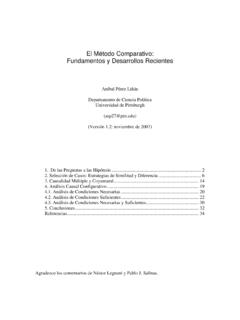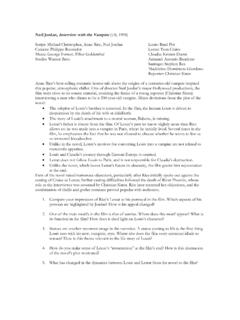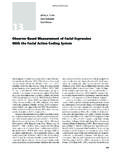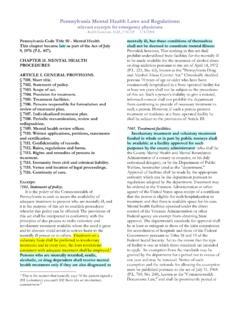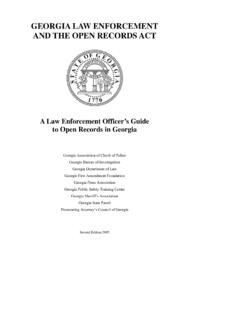Transcription of Pennsylvania Mental Health Laws and Regulations: relevant ...
1 Pennsylvania Mental Health Laws and Regulations: relevant excerpts for emergency physicians --Keith Conover, , FACEP 1/4/2004 Pennsylvania Code Title 50 - Mental Health This chapter became law as part of the Act of July 9, 1976 ( 817). CHAPTER 15. Mental Health PROCEDURES ARTICLE I. GENERAL PROVISIONS. 7101. Short title. 7102. Statement of policy. 7103. Scope of act. 7104. Provision for treatment. 7105. Treatment facilities. 7106. Persons responsible for formulation and review of treatment plan. 7107. Individualized treatment plan. 7108. Periodic reexamination, review and redisposition. 7109. Mental Health review officer. 7110. Written applications, petitions, statements and certification. 7111. Confidentiality of records.
2 7112. Rules, regulations and forms. 7113. Rights and remedies of persons in treatment. 7114. Immunity from civil and criminal liability. 7115. Venue and location of legal proceedings. 7116. Continuity of care. Excerpt: 7102. Statement of policy. It is the policy of the Commonwealth of Pennsylvania to seek to assure the availability of adequate treatment to persons who are mentally ill, and it is the purpose of this act to establish procedures whereby this policy can be effected. The provisions of this act shall be interpreted in conformity with the principles of due process to make voluntary and involuntary treatment available where the need is great and its absence could result in serious harm to the mentally ill person or to others.
3 Treatment on a voluntary basis shall be preferred to involuntary treatment; and in every case, the least restrictions consistent with adequate treatment shall be Persons who are mentally retarded, senile, alcoholic, or drug dependent shall receive Mental Health treatment only if they are also diagnosed as 1 This is the section that basically says if the patient signed a 201 (voluntary) you can t 302 them (do an involuntary commitment. mentally ill, but these conditions of themselves shall not be deemed to constitute Mental illness: Provided, however, That nothing in this act shall prohibit underutilized State facilities for the mentally ill to be made available for the treatment of alcohol abuse or drug addiction pursuant to the act of April 14, 1972 ( 221, No.))
4 63), known as the " Pennsylvania Drug and Alcohol Abuse Control Act." Chronically disabled persons 70 years of age or older who have been continuously hospitalized in a State operated facility for at least ten years shall not be subject to the procedures of this act. Such a person's inability to give a rational, informed consent shall not prohibit the department from continuing to provide all necessary treatment to such a person. However, if such a person protests treatment or residence at a State operated facility he shall be subject to the provisions of Article III. 7105. Treatment facilities. Involuntary treatment and voluntary treatment funded in whole or in part by public moneys shall be available at a facility approved for such purposes by the county administrator (who shall be the County Mental Health and Mental Retardation Administrator of a county or counties, or his duly authorized delegate), or by the Department of Public Welfare, hereinafter cited as the "department.
5 " Approval of facilities shall be made by the appropriate authority which can be the department pursuant to regulations adopted by the department. Treatment may be ordered at the Veterans Administration or other agency of the United States upon receipt of a certificate that the person is eligible for such hospitalization or treatment and that there is available space for his care. Mental Health facilities operated under the direct control of the Veterans Administration or other Federal agency are exempt from obtaining State approval. The department's standards for approval shall be at least as stringent as those of the joint commission for accreditation of hospitals and those of the Federal Government pursuant to Titles 18 and 19 of the Federal Social Security Act to the extent that the type of facility is one in which those standards are intended to apply.
6 An exemption from the standards may be granted by the department for a period not in excess of one year and may be renewed. Notice of each exemption and the rationale for allowing the exemption must be published pursuant to the act of July 31, 1968 ( 769, No. 240), known as the "Commonwealth Documents Law," and shall be prominently posted at Page 2 of 9 the entrance to the main office and in the reception areas of the facility. 7114. Immunity from civil and criminal liability. (a) In the absence of willful misconduct or gross negligence, a county administrator, a director of a facility, a physician, a peace officer or any other authorized person who participates in a decision that a person be examined or treated under this act, or that a person be discharged, or placed under partial hospitalization, outpatient care or leave of absence, or that the restraint upon such person be otherwise reduced, or a county administrator or other authorized person who denies an application for voluntary treatment or for involuntary emergency examination and treatment, shall not be civilly or criminally liable for such decision or for any of its consequences.
7 (b) A judge or a Mental Health review officer shall not be civilly or criminally liable for any actions taken or decisions made by him pursuant to the authority conferred by this act. ARTICLE II. VOLUNTARY EXAMINATION AND TREATMENT. 7201. Persons who may authorize voluntary treatment. 7202. To whom application may be made. 7203. Explanation and consent. 7204. Notice to parents. 7205. Physical examination and formulation of individualized treatment plan. 7206. Withdrawal from voluntary inpatient treatment. 7207. Transfer of person in voluntary treatment. Excerpts: 7201. Persons who may authorize treatment Any person 14 years of age or over who believes that he is in need of treatment and substantially understands the nature of voluntary treatment may submit himself to examination and treatment under this act, provided that the decision to do so is made voluntarily.
8 A parent, guardian, or person standing in loco parentis to a child less than 14 years of age may subject such child to examination and treatment under this act, and in so doing shall be deemed to be acting for the child. Except as otherwise authorized in this act, all of the provisions of this act governing examination and treatment shall apply. 7202. To whom application may be made. Application for voluntary examination and treatment shall be made to an approved facility or to the county administrator, Veterans Administration, or other agency of the United States operating a facility for the care and treatment of Mental illness. When application is made to the county administrator he shall designate the approved facility for examination and for such treatment as may be appropriate.
9 7203. Explanation and consent. Before a person is accepted for voluntary inpatient treatment, an explanation shall be made to him of each treatment, including the types of treatment in which he may be involved, and any restraints or restrictions to which he may be subject together with a statement of his rights under this act. Consent shall be given in writing upon a form adopted by the department. The consent shall include the following representations: That he understands his treatment will involve inpatient status; that he is willing to be admitted to a designated facility for the. purpose of such examination and treatment; and that he consents to such admission voluntarily, without coercion or duress; and, if applicable, that he has voluntarily agreed to remain lit treatment for it specified period of no longer than 72 hours after having given written notice of his intent to withdraw front treatment.
10 The consent shall be part of the person's record . 7206. Withdrawal from voluntary inpatient treatment (a) A person in voluntary inpatient treatment may withdraw at any time by giving written notice unless, as stated in section 203, he has agreed in writing at the time of his admission that his release can be delayed following such notice for a period to be specified in its agreement, provided that such period shall not exceed 72 hours. Any patient converted from involuntary treatment ordered pursuant to either section 304 or 305 to voluntary treatment status shall agree to remain in treatment for 72 hours after having given written notice of his intent to withdraw from treatment. (b) If the person is under the age of 14, his parent, legal guardian, or person standing in loco parentis may effect his release.


